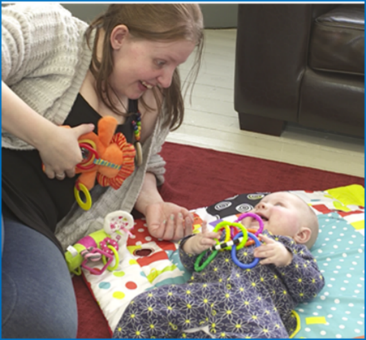What is eTIPS?
eTIPS - Early Therapy in Perinatal Stroke, is a new home-based intervention for babies affected by perinatal stroke, developed by a multidisciplinary team at Newcastle University with funding through an NIHR Career Development Fellowship to Dr Anna Basu.
What happens after a perinatal stroke?

How would eTIPS help?
What would be the effect of giving an early therapy intervention during those first 6 months of life? Could this optimise the retention of the crossed corticospinal tract projection from the damaged hemisphere and could better outcomes be achieved? We have developed eTIPS to target this time window using a lateralised approach to the infant whereby we ask parents to approach their infant from the potentially affected side in all their everyday activities. Families are provided with instructional materials which explain the eTIPS intervention. It is a pervasive therapy – carried out constantly throughout the first six months of life.
How were the eTIPS materials developed?
Using a participatory design process we have produced a series of pictorial manuals and videos to explain the eTIPS intervention approach and delivery to families. As part of the participatory design process we held focus groups with parents of children who had a perinatal stroke in the past, and also with healthcare professionals. Through listening to their feedback we made iterative changes to the resources to make them as acceptable and workable as possible for families.
The eTIPS materials are designed so that families can optimise time spent with their new baby to give extra attention to the potentially affected side in ways which are easily incorporated in to everyday life. We have received funding from the National Institute of Health Research, Newcastle upon Tyne Hospitals NHS Charity and from the Tiny Lives Charity in Newcastle for this development work. We have published an open access paper about the intervention development process, in BMC Pediatrics (DOI: 10.1186/s12887-017-0797-9), and have presented the findings at national and international meetings.
How are the materials being used now?
We have been conducting a pilot feasibility and acceptability study in the Northern Region of England where participating families have been given these developmental resources and additional support and advice throughout the first six months of life (corrected gestational age). We have collected qualitative information about eTIPS through observations and interviews with participating parents, their community paediatric therapists and also from members of the eTIPS Team. Our qualitative researcher is now analysing this data, looking for common themes to help establish how best to deliver this intervention and to help inform further developments with eTIPS. We have also collected some data on the development of babies who have not had a stroke. Alongside this we have been working on an approach to gather information on infant movements using movement sensors as well as observation and videoing. We are working with computing science colleagues to make the most of this data about early development of movement control. We are also piloting the use of relevant outcome measures with these infants including the General Movements Assessment, the Alberta Infant Motor Scale (AIMS) and the Hand Assessment for Infants (HAI). The HAI is a brand new assessment which measures manual development and possible upper limb asymmetry of infants aged 3 to 12 months who are at risk of developing cerebral palsy. It is a ‘sister assessment’ to the Assisting Hand Assessment (AHA) used with older children with hemiplegia.
Who are the eTIPS Team?
The eTIPS multidisciplinary team is led by Dr Anna Basu, NIHR Career Development Fellow and Honorary Consultant Paediatric Neurologist and comprises Rose Watson, Qualitative Research Assistant, Janice Pearse, Paediatric Occupational Therapist and Pat Dulson, Neonatal Physiotherapist. Dr Tim Rapley, Medical Sociologist, Professor Luke Vale, Health Economist and Denise Howel, Statistician are advising on the project. We also have a number of students from a variety of backgrounds who are assisting with the eTIPS research.
What next?
This eTIPS feasibility study will conclude in summer 2017 and we will then complete our evaluation of eTIPS. This study is to understand whether parents find the materials workable and acceptable, and to help us prepare for the next stage which would be a multicentre, randomised controlled trial (RCT). This trial will compare the effect of parent-delivered home-based therapy in the first 6 months of life with standard care on motor outcome in infants with perinatal stroke. Please note the eTIPS approach and the materials are still under evaluation - at present we are trying to find out if eTIPS is workable which is why we need to do an RCT to establish if it is effective before we can recommend the approach and make the materials widely available.
We have collaborators in Pisa who are undertaking a parallel feasibility study - so we have translated the materials into Italian! We are now developing an online educational package for therapists, thanks to further funding from the Tiny Lives Charity.
During September 2017 we have been holding workshops with a range of healthcare professionals including physiotherapists, occupational therapists and neonatologists. Both professionals who were involved in the feasibility study and others who are interested in becoming involved in the RCT have taken part. They have shared their thoughts on a number of specific issues around the proposed RCT including the practicalities of delivering eTIPS to families and carrying out assessments with young infants. We have also been exploring what constitutes 'standard care' for these infants in today's NHS and probable eligibility and recruitment issues. Additionally we have met with a group of parents to find out their views on the potentially tricky issues of randomisation and cranial imaging for research. We will now carefully analyse and consider this information in designing a randomised trial of eTIPS.
How can I find out more?
To keep up to date on developments with eTIPS, to get involved or to find out about our other research please visit https://research.ncl.ac.uk/earlytherapy/ or email: eTIPS@ncl.ac.uk
